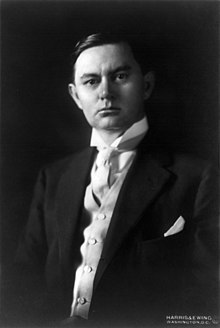Thomas W. Hardwick
Thomas William Hardwick (born December 9, 1872 in Thomasville , Thomas County , Georgia , † January 31, 1944 in Sandersville , Georgia) was an American lawyer, politician and governor of the state of Georgia.
Early years and political advancement
The young Thomas Hardwick studied law at Mercer University in Macon and then at the University of Georgia . After successfully completing his studies in 1893, he was admitted to the Georgia bar. He served as an attorney from 1893 to 1895 before becoming a district attorney for the Washington County . Since 1897 he was politically active. That year he was elected to the Georgia House of Representatives, where he was to stay for four years. He then successfully ran for a seat in the United States House of Representatives . There he represented the interests of his constituency until 1914. As 1914 US Senator Augustus Octavius Bacondied in office, Hardwick was elected his successor in the Senate . He remained in the Senate for the next five years, where, although also a Democrat , he became a critic of President Woodrow Wilson's policies . In particular, he was against the American entry into the war. In 1918 he was no longer elected to the Senate. In spring 1919, he was the victim of a letter bomb attack, along with other targets and groups. He was unharmed, but the housekeeper who opened the letter was wounded. These attacks were then used by US Attorney General Alexander Mitchell Palmer as an opportunity for large-scale raids against mainly Russian immigrants who, as communists, were blamed for the attacks. These raids went down in American history as the Palmer Raids .
Georgia Governor
In 1920 Hardwick applied for the office of governor. With the help of the Ku Klux Klan , he managed to defeat his inner-party opponent Clifford Walker . At that time, the Democratic Party in Georgia had an absolute majority. The Republicans played no role and had no chance for decades. Therefore, the internal party elimination was practically synonymous with the election victory for the Democrats. After his election, Hardwick turned out to be more liberal than expected. He distanced himself from the Ku Klux Klan and implemented prison reform. Among other things, the whipping of prisoners was prohibited. Another goal was to upgrade the roads in Georgia. To this end, he introduced a mineral oil tax, which was used to finance the project. Governor Hardwick also became known through the appointment of Rebecca Latimer Felton as a US Senator. She was the first woman who ever entered the US Senate; however, she only held this office for one day.
In 1922, Hardwick ran for re-election. In the meantime, however, it became clear how strong the Ku Klux Klan was in Georgia at that time. His 1920 opponent, Clifford Walker, had now allied himself with this radical group. This led to the election of Governor Hardwick.
Old age and death
Hardwick was employed by the US Department of Justice the year after he left. In 1924 his attempt to be re-elected to the Senate failed. In 1932 he failed in a renewed attempt to win the Georgia gubernatorial election, already in the primaries. He worked as a lawyer until his death. One of his clients was also the Soviet ambassador to the United States. In this context, Hardwick played an important role in the recognition of the Soviet Union by the American government.
Hardwick had been married to Maude Perkins since 1894, with whom he had a daughter. After his wife's death in 1937, he married Sally Warren West.
literature
- James F. Cook: The Governors of Georgia, 1754-2004. 3rd edition, Mercer University Press, Macon (Georgia) 2005.
- Josephine Mellichamp: Senators from Georgia. Strode Publishers, Huntsville, Alabama 1976.
Web links
- Thomas W. Hardwick in the Biographical Directory of the United States Congress (English)
- Thomas W. Hardwick in the database of Find a Grave (English)
- The New Georgia Encyclopedia (English)
- Thomas Hardwick in the National Governors Association (English)
| personal data | |
|---|---|
| SURNAME | Hardwick, Thomas W. |
| ALTERNATIVE NAMES | Hardwick, Thomas William (full name) |
| BRIEF DESCRIPTION | American lawyer and politician |
| DATE OF BIRTH | December 9, 1872 |
| PLACE OF BIRTH | Thomasville , Georgia |
| DATE OF DEATH | January 31, 1944 |
| Place of death | Sandersville , Georgia |



